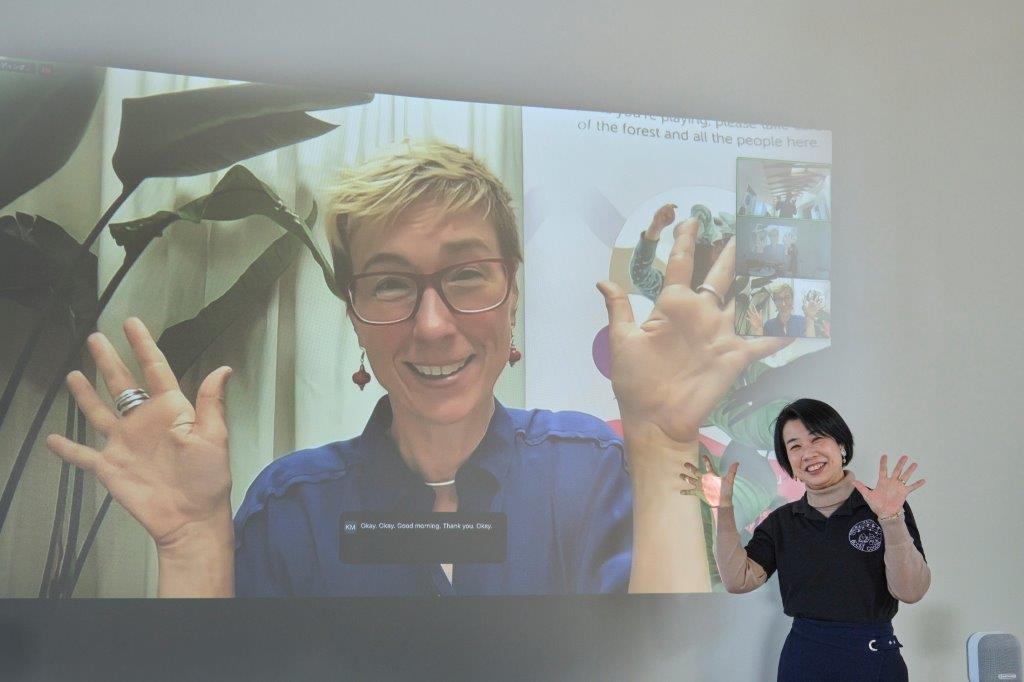
Cultural exchange initiatives are often conducted between Australia and Japan. One such example is the collaboration between Australian performance group, Polyglot Theatre, founded in 1978, and Acchi Cocchi, a Japanese non-profit organisation. Since 2015, the two organisations have been visiting local primary schools and special needs schools in places such as Minamisanriku, and Yokohama, holding unique participatory workshops. What can we learn from each other's art and culture, and how can we give back to society? We spoke with Rainbow Sweeny, producer of Polyglot Theatre, and Mikako Atsuchi, president of Acchi Cocchi.
Part.1
Producer of Polyglot Theatre
Rainbow Sweeny
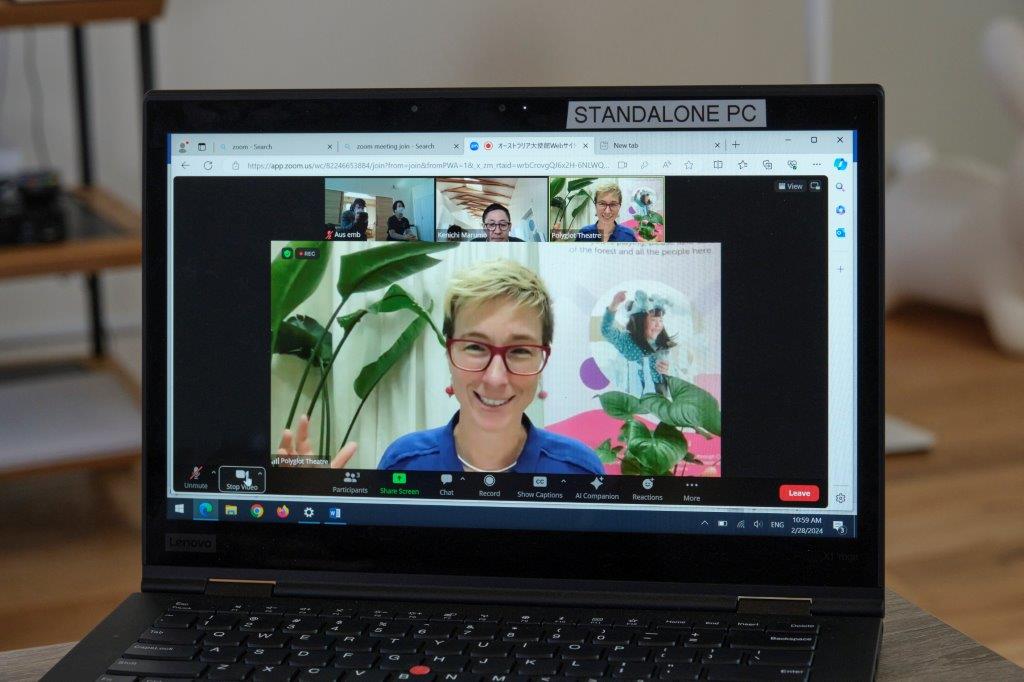
Planning participatory workshops for children and families
—— Polyglot Theatre is known for its unique performances for children, but could you please tell us more about its mission and activities?
Polyglot Theatre offers a variety of performance programs primarily aimed at children and families. All of these are participatory workshops. We like to place the child's voice at the centre of everything we do. We want the children to feel that they are the leaders, creatively and culturally. That is our mission.
—— Please tell us more about your performances for children in Australia.
Polyglot Theatre offers a very diverse program of work. We do main stage productions for families and children, but we also visit schools to give performances. We have also held participatory workshops in Japan.
For example, next week we are performing one of our participatory workshops, ‘Pram People’, in Western Australia. We will then perform the same work in Hong Kong.
—— What kind of performance is ‘Pram People’?
Pram means stroller, and ‘Pram People’ is a participatory workshop for parents and young children. Adults are provided with headphones, which allow them to listen to stories and instructions, while pushing their little children around in a pram, and enjoy their own world. It's a beautiful work. It becomes a piece of public choreography, with the participants almost dancing with children in strollers.
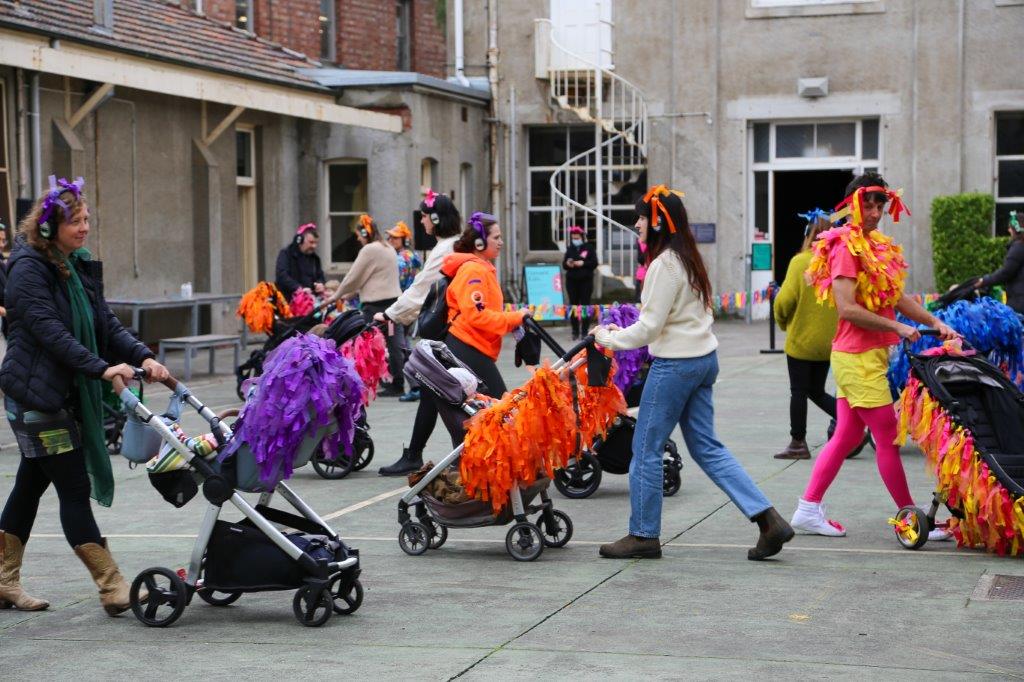
‘Pram People’ in Abbotsford Convent, Melbourne. Photographer: Kenny Waite
We collaborated with many people to create this work. Young parents, grandparents remembering being young parents, and children. We created a beautiful audio work with these memories.
There is also a work created specifically for children with complex disabilities called ‘When the World Turns’. In this work, we invite families or school groups to come into the beautiful world we have created with thousands of plants, because we recognise that these communities often have very little access to nature and artistic experiences.
This piece was created in collaboration with a theatre company from the United Kingdom called Oily Cart and premiered at a disability festival at the Art Centre in Melbourne. This year (2024), we are planning to go on a 10-week tour of schools in Australia with this work.
In the same way that we visited special needs schools for children with disabilities in Japan, we will also visit 10 different schools in Australia. We will spend one week at each school.
‘Paper Planet’ - an enormously popular work in Minamisanriku
—— Please also tell us about ‘Paper Planet’, which you have previously performed in Japan.
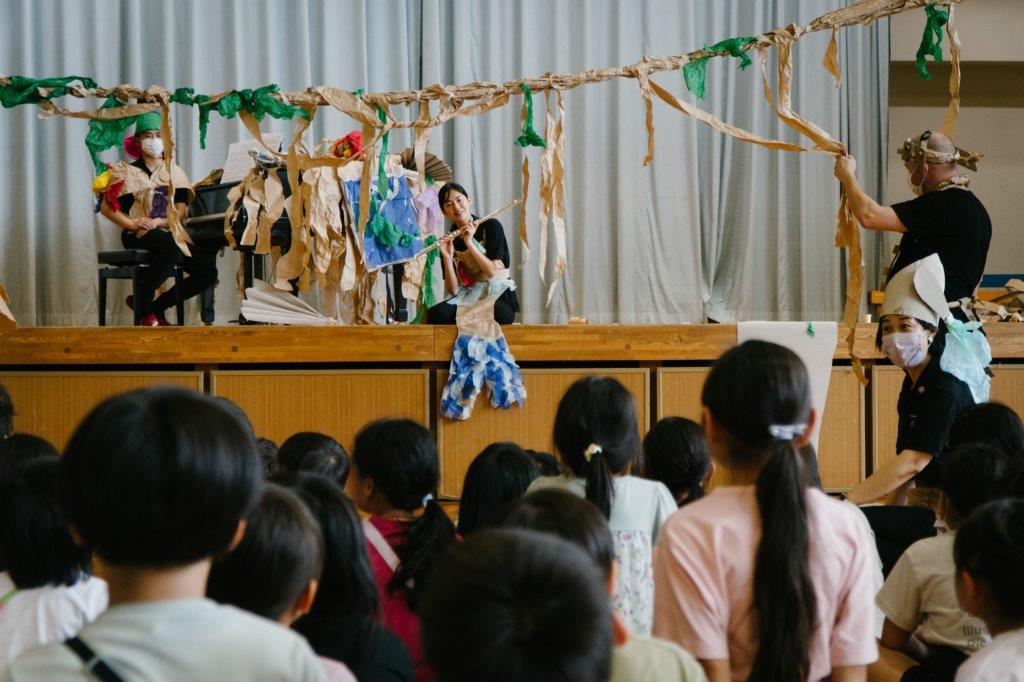
‘Paper Planet’ workshop, held at a school in Yokohama. Photographer: Ai Ueda
‘Paper Planet’ is a participatory workshop where children can freely create a world using paper and tape in a forest full of cardboard trees. We will be taking ‘Paper Planet’ to California and Arizona in America next week. We plan to hold a large-scale ‘Paper Planet’ event there.
What we did in Japan was a small version, held with just one class of school students each time (supported by the Australia-Japan Foundation). With the Yokohama Children's Hospice Project, we also held workshops for small groups of families. On the other hand, we can do a version with 100 people participating at a time. ‘Paper Planet’ is very flexible. Last spring (2023), we held a two-week workshop at the Sydney Opera House, with almost 5,000 participants.

—— For Polyglot Theater, what is the significance of your activities overseas, particularly in Japan?
International collaboration for Polyglot is very important. We really value meeting new people, and working in different cultural contexts. It's very rewarding as an artist, and really helps us to grow as our company. Every time we do a new collaboration, every time we work with a new community of families or children, we learn more.
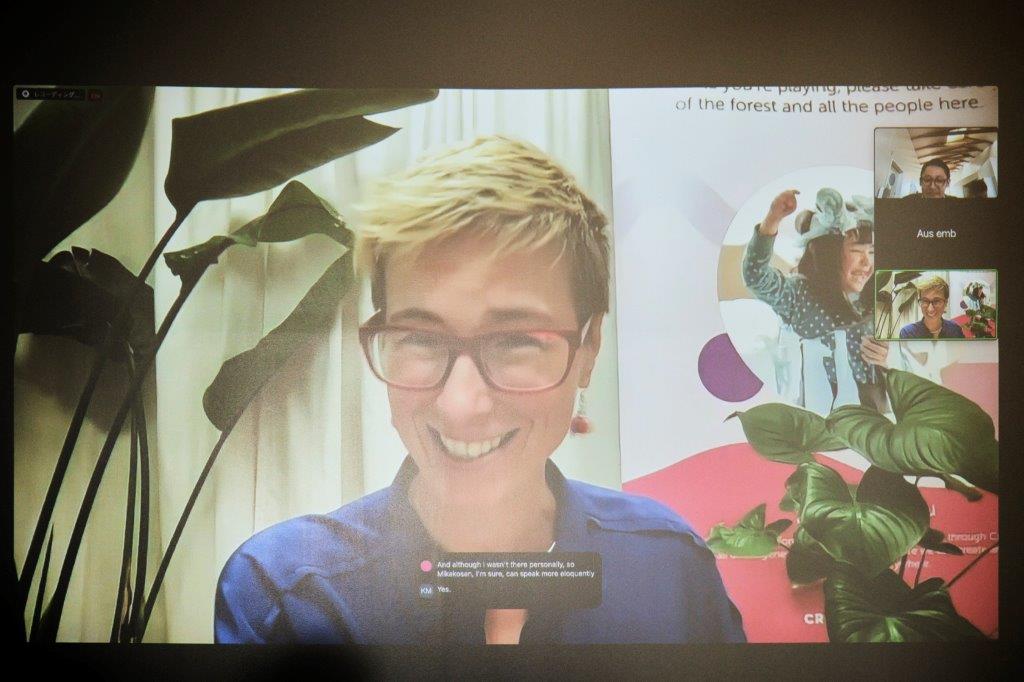
—— When you hold a workshop in Japan, do you do anything different from what you do in Australia?
People sometimes ask us, ‘Are there any differences in children in different countries?’ The answer is, ‘Not really.’ We are all the same in our hearts. People all over the world connect with Polyglot's work because you can participate in our workshops in various ways. With all of our works you can participate in different ways depending on who you are.
The response from Japanese children and families has always been very positive. ‘Paper Planet’ in particular uses very little language. The work we do together is universally accessible and children immediately know what to do. That being said, there are times when some very small modifications can be made to help people from different cultures to understand.
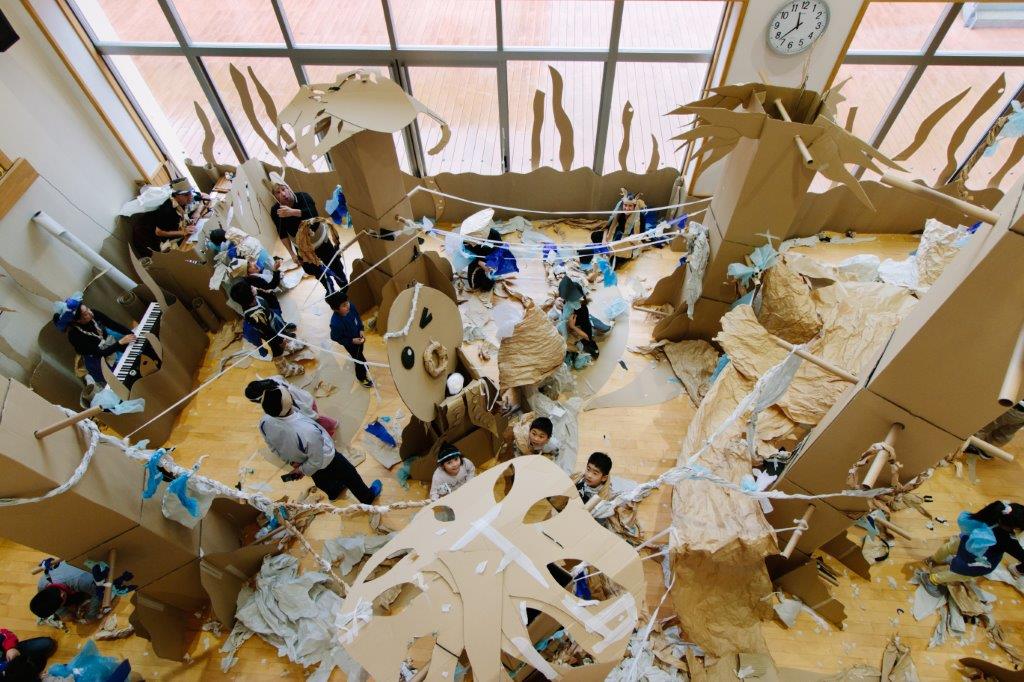
‘Paper Planet’ in Minamisanriku. Photographer: Ai Ueda
For example, if we were to perform ‘Pram People’ in Japan, we would look to create a Japanese audio version of that work. So, we would hope to work with grandparents and parents from Japan, to create and to hear their stories, so that the audio in the workshop feels personal. All parents around the world share similar stories, but we also all grow up in the stories of our own communities. That's why in ‘Pram People’ we would try to develop our work with the local community.
Polyglot supporting cultural revival
—— Polyglot Theatre and Acchi Cocchi have held several performances together so far. Please tell us how the collaboration came about.
Polyglot and Acchi Cocchi met in 2015 at an art fair called TPAM (Tokyo Performing Arts Market/now YPAM = Yokohama International Performing Arts Meeting), an international performing arts meeting held in Yokohama. Polyglot is always looking for new collaboration possibilities. Acchi Cocchi is a classical music-based company, and Polyglot specialises in participatory performances, so we thought it would be good combination.
We hit it off straight away, and in the same year we decided to hold a collaborative program in Minamisanriku (Miyagi Prefecture). Acchi Cocchi had already been involved in various activities in the Tohoku region for several years after the earthquake. Polyglot had also already visited Minamisanriku, so we thought it would be a perfect fit.
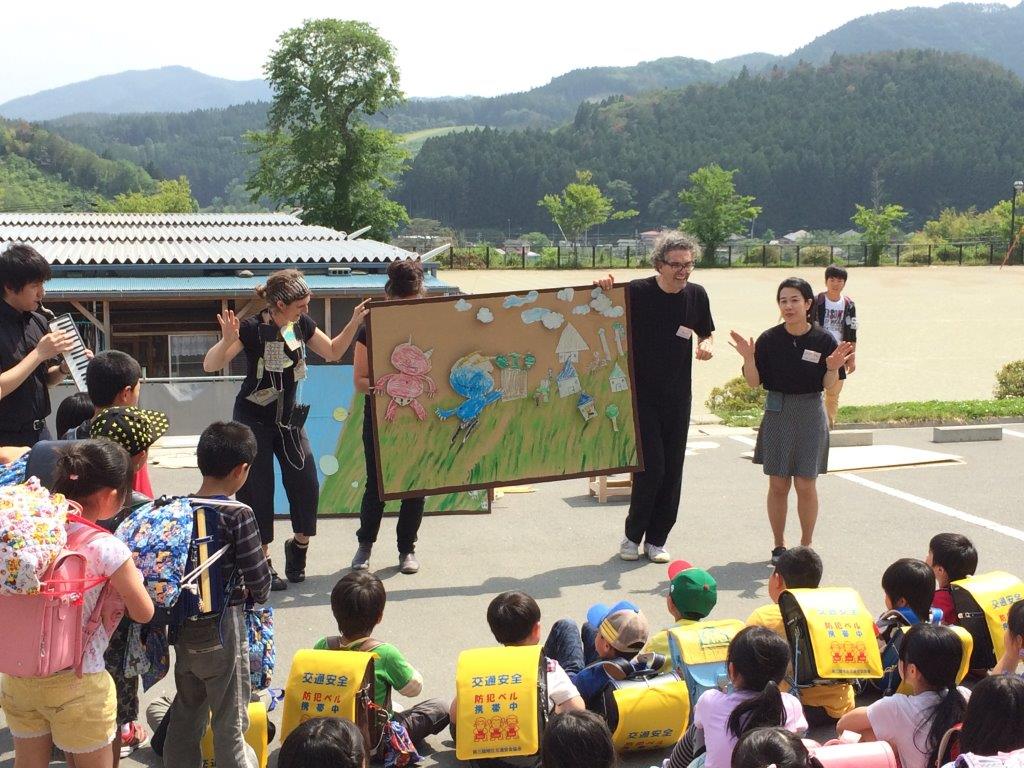
The first collaboration in Minamisanriku in 2015
—— Since the Great East Japan Earthquake in 2011, the members of Polyglot Theatre have visited Minamisanriku multiple times to perform. How have the people reacted? Also, have you noticed any changes each time you visit?
I think the first time we visited Minamisanriku was a few months after the earthquake. At that time, it was before the reconstruction started and it was still in a terrible state. However, we were grateful to the Australian Government for inviting us. We saw the disaster area, and we felt that there was something that Polyglot could do there. Because, although we can't build houses, we can help to build the community and cultural recovery for children and families.
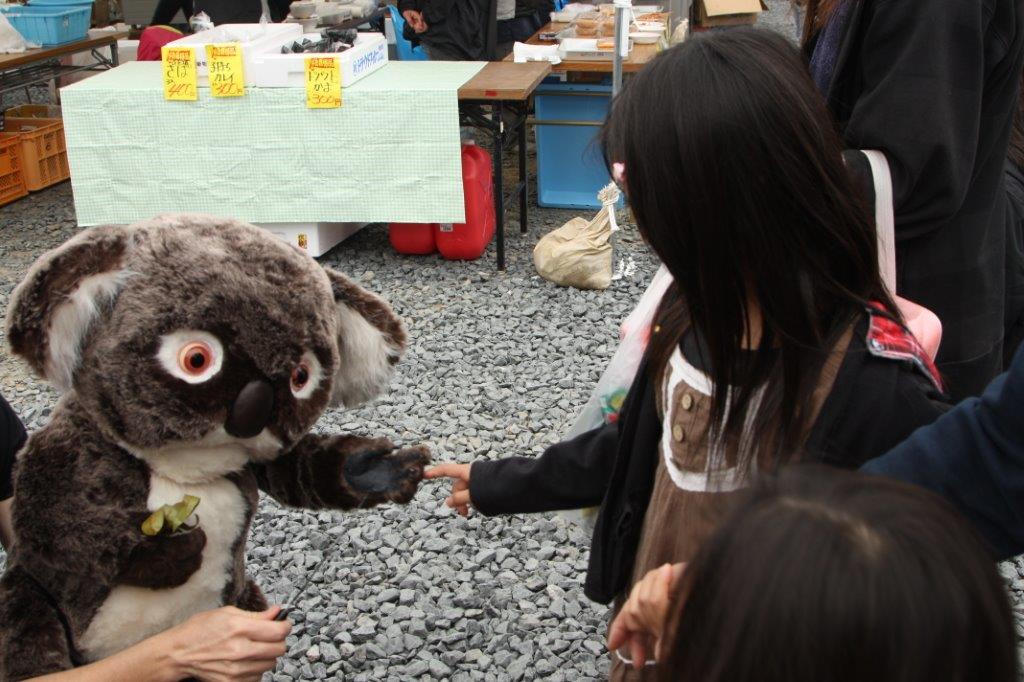
Polyglot Theatre members visiting Minamisanriku in 2011 and interacting with disaster victims
After that, we held a participatory workshop in Minamisanriku in 2013, again with an invitation from the Australian Government and a grant from the Australia-Japan Foundation. The performance was one of Polyglot's works, ‘We Built This City’. In Minamisanriku, this event was held as ‘We Built This Town’. It was a very enjoyable visit. We took over the whole Bayside Arena in Minamisanriku and used three thousand cardboard boxes to build houses, roads, and towns, together with the children. They used small cardboard boxes to create their own dream home with the theme ‘My Dream House’.
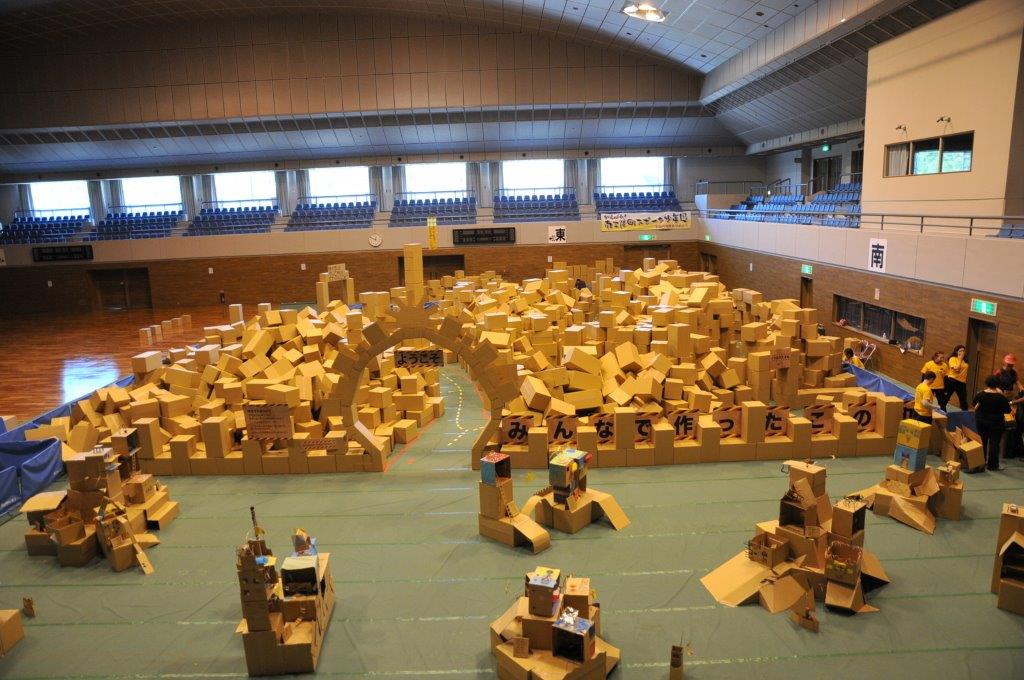
‘We Built This Town’ performed at Minamisanriku Bayside Arena
The first collaboration with Acchi Cocchi was in May 2015. After that, we visited again in March 2018, performing ‘Paper Planet’ in all of Minamisanriku's primary schools, several preschools and at the Bayside Arena. (Both visits were supported by the Australia-Japan Foundation.)
We are able to provide the best experience for children because of our long-term trusting relationship.
—— How do you view the current Japan-Australia relationship?
It is such a strong relationship. I feel great joy every time I visit Japan. There is a beautiful relationship between Australians and Japanese people, and everybody I know who has visited Japan has had an excellent time. Whether that be for work, or travel for pleasure. I hope to visit again very soon.
—— Please tell us if there is anything you have learned from Japanese culture and art during your long relationship.
That's a good question. It's hard to define, but we're always learning from each other's cultures. We especially get a lot of inspiration when we have a true exchange with organisations like Acchi Cocchi. Every time we collaborate with artists or musicians for the first time, we're learning from them about ourselves as well as about them. It's very interesting to work with new people and understand how they work.
For example, many of the musicians working with Acchi Cocchi are classically trained and put so much preparation into their performances. Polyglots, on the other hand, are a bit more chaotic. However, we're very well practiced at how to respond to children, and change the contest as necessary. So, for a musician who is used to rehearsing and performing the same perfect music, collaboration may lead to new discoveries.
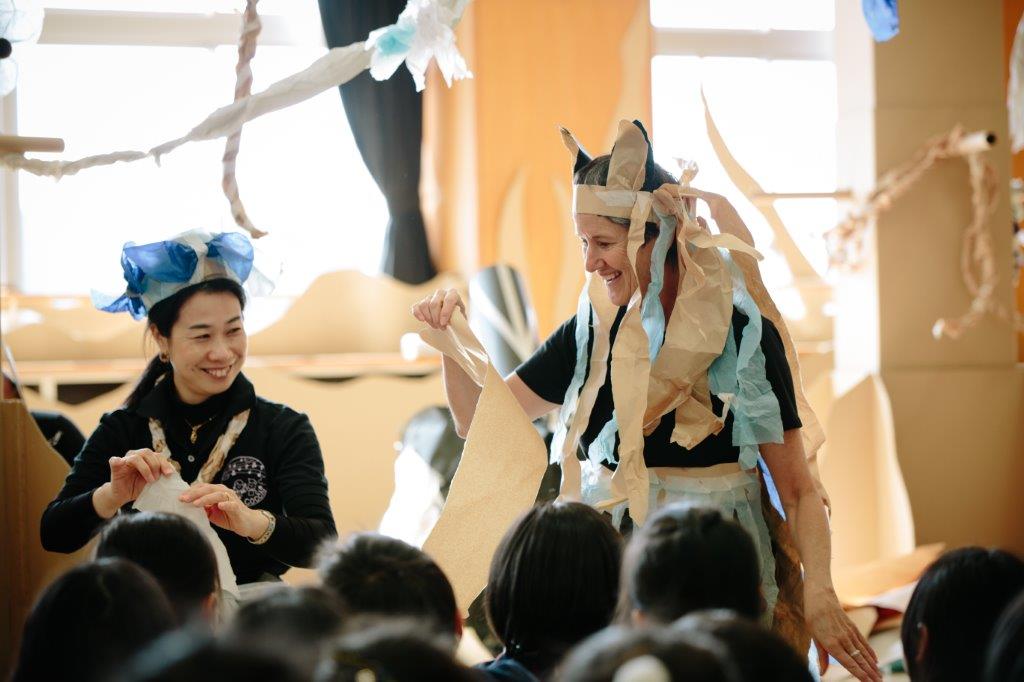
The rapport between the two organisations supports the performance. Photographer: Ai Ueda
One of the beautiful things about a long collaboration like we have between Polyglot and Acchi Cocchi is the trust that develops. As artists, we know each other's methods and the way we work. These relationships are especially important for a theatre company like ours, which improvises performances in response to children's reactions. Trust is built up over years so that we can deliver the best possible experience for our children.
—— If there are any initiatives or events you would like to work on with Acchi Cocchi in the future, please let us know the details.
Mikako (Mikako Atsuchi, president of Acchi Cocchi) and I are always thinking about what kind of collaboration we can do next. It was fantastic last year (2023) to visit Yokohama and do participatory workshops together at special needs schools and also in the children's hospice. In the future, we would like to hold similar workshops, not only in Yokohama, but in other places as well.
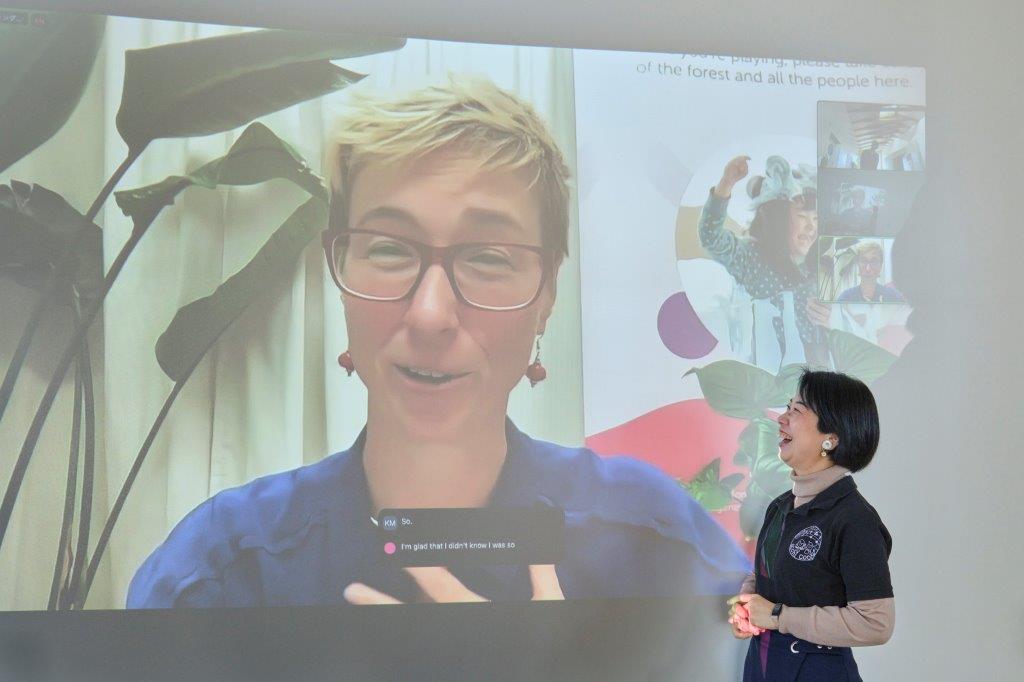
There are no solid plans yet, but we are working hard to try to come back to collaborate in Japan again. If possible, next time we would love to do a different version of ‘Paper Planet’ for families. Of course, we would also like to continue holding workshops at special needs schools and other places. So, we will keep planning and trying to get funding to do some more projects together.
Our dream is to create a work from scratch with Acchi Cocchi.
—— Are there any goals you would like to achieve through Polyglot Theatre's activities?
We are always making new works at Polyglot. We would like to create more works with a long life like ‘Paper Planet’, which has been performed around the world for 11 years now. We always have new show ideas in our heads.
Work on a new piece started just a few weeks ago. It is a work that will be for children and adults together, where we hope to reconnect urban families with nature. It is called ‘Forest’. As the name suggests, the performances will take place in the forest, so taking city families out of town a little bit, to have an arts experience in nature.
We are still at the very beginning of developing this new work, but we would like to hold it at a botanical garden on the outskirts of Melbourne if possible. It's a little bit out of town, but still a convenient distance to visit. There are many such places in Australia, which is rich in nature. We will keep looking for areas where participants can feel like they are in nature.

Forest by Polyglot Theatre. Creative development at Royal Botanic Gardens Cranbourne, Australia. Photographer: Claudia Sangiorgi Dalimore
We want to give people the sense that they are surrounded by nature. It is good for the soul. So, we hope that ‘Forest’ will become one of our works that we can take to different countries and different cities, and work with local collaborators to find a suitable location to stage it.
I’m sure we’ll make a site-specific version for each place we visit. Although we're not looking to create an educational show, we would like to provide information such as what species of plants are here, what insects live here, what creatures lived here in the past but maybe don't live here anymore. It would be interesting to incorporate these things into the show.
—— I would love to see your new performance in Japan. Do you have any other dreams that you would like to accomplish with your Japanese partner, Acchi Cocchi?
If there were ever an opportunity, it would be so wonderful to create a new work together. That would be my ultimate ambition. Our aim is to create something new together. Collaborating internationally is hard but my dream is to one day create a new piece from scratch with Mikako!
Part.2
President of Acchi Cocchi
Mikako Atsuchi
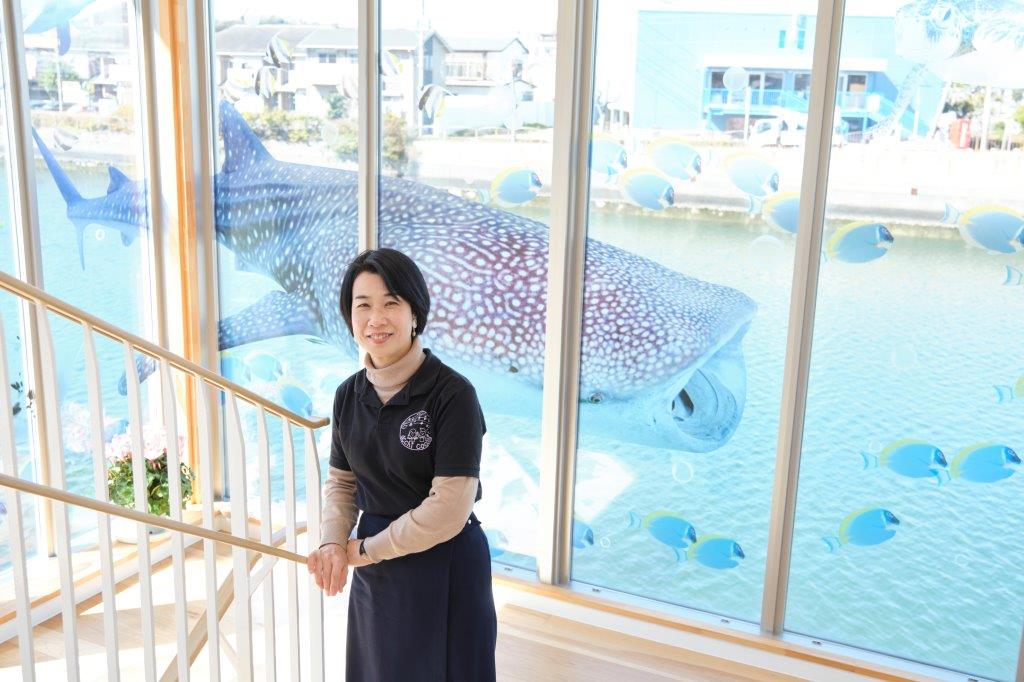
I want to bring smiles to people’s faces through art.
—— Ms Atsuchi, what kind of activities is Acchi Cocchi usually involved in?
Acchi Cocchi is an artistic group whose mission is to bring a smile to the face of many people through art. We have many classical musicians, but we also have artists and dancers. Currently, we have 70 members. In addition to musicians, we have oil painters, computer graphic designers, videographers, dyers, sculptors...and our dance genres are truly diverse, ranging from classical ballet to contemporary and jazz dance. I also majored in piano at music college.

Before launching Acchi Cocchi, I worked for 20 years in a classical music concert management company. There I worked as manager of artists, and other areas such as music festival planning and management. The turning point came for me with the Great East Japan Earthquake in 2011. I originally wanted to quit my job in 2010 and start supporting young artists, but there was no business model to make that happen.
This was the timing at which the earthquake occurred, and I wanted to use my past experience to provide support in the disaster-stricken areas. So, I established the community group, Acchi Kocchi-no-kai, and started activities like holding concerts with young artists in the disaster-stricken areas. Later, in 2013, it became a not-for--profit organisation and continues to operate today.
Currently, we have expanded our activities to schools, nursing care facilities, local communities, and cultural facilities, and hold more than 100 concerts and workshops a year.
There is a group in Australia doing similar activities!
—— Please tell us how you started collaborating with Polyglot Theatre.
From the time when we originally launched the group, we wanted to carry out international exchange initiatives. At the time of our founding, the only models for contributing to society through art were overseas and we wanted to make some connections. Furthermore, at my previous job, I had experience planning and running a music festival for children in collaboration with an overseas art company, so I felt there was potential in collaboration with overseas artists.

Around that time, at TPAM (Tokyo Performing Arts Market/now YPAM, Yokohama International Performing Arts Meeting), a German artist who had heard my lecture told me, ‘There's a group in Australia doing similar activities!’ and I was introduced to the members of Polyglot Theatre.
I passed on my contact details, and immediately received an email from the leader of Polyglot at the time asking if there was anything we could do together. We decided that we would hold a participatory performance in Minamisanriku in June 2015. It was a truly exciting development. Since then, we have also held collaboration workshops in 2018 and 2023.

Collaboration in Yokohama in 2023
Collaborations with artists other than Polyglot
—— You have collaborated with artists in Australia other than Polyglot Theatre, haven't you?
That's right. In 2018, we held a spatial art presentation and performance in Yokohama called ‘The KARAOKE Project’ in collaboration with Australian sound artists Madeleine Flynn and Tim Humphrey, whom I met through the Australia Council (now Creative Australia). In fact, they had a great interest in Japanese karaoke and we spoke of how karaoke can connect people's hearts. So, we created a performing art production based on that theme. We held a workshop at a primary school in Yokohama, and also presented an event at ‘The CAVE’, an art space in Kannai, Yokohama.
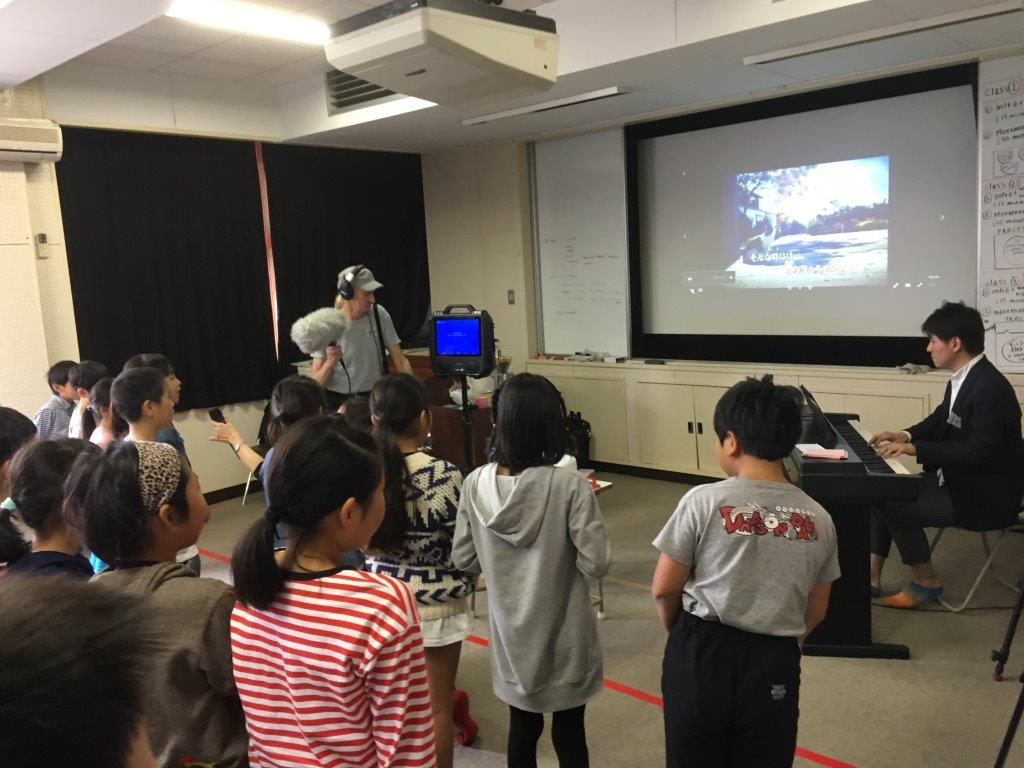
As well as this, in 2019, as part of an international collaboration with Australia, we held ‘Dining Room Tales’ in Yokohama, Osaka, and Sydney, in which artists talked about their lives through food. ‘Dining Room Tales’ was a collaboration led by Melbourne-based art director, Xan Colman, and a pianist from Acchi Cocchi participated in the event.
In this production, the artists themselves created dishes that have memories for them, accompanied by music with which they are connected. They sat down at the table with the participants to give a true slow-life performance in which they talked about their own upbringing and artistic views.
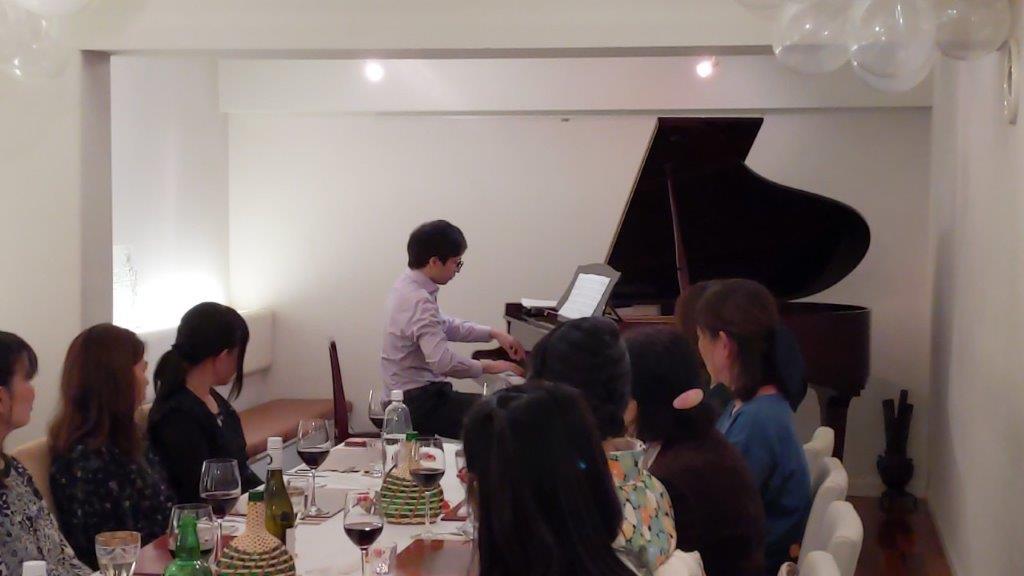
The first collaboration in Minamisanriku in 2015
—— Please tell us about your recent activities supported by the Australia-Japan Foundation.
In June 2023, together with Polyglot Theatre, we held a performance of ‘Paper Planet’ for preschoolers and primary school students in Yokohama. In addition to visiting four primary schools and two special needs schools in Yokohama, we also visited the Yokohama Children's Hospice Project, where we jointly held a participatory workshop that combined art and music. I think we performed over 10 times at 7 locations in total.

As I mentioned earlier, the first time we collaborated with Polyglot was in Minamisanriku in May 2015. We held a workshop that resembled a cafe concert, combining art and music. At that time, reconstruction was progressing at a tremendous pace, and Minamisanriku was full of dump trucks, making it difficult for children to play outside.
We discussed with the members of Polyglot Theatre how we could bring more joy to this situation, and in the end we put on an impromptu puppet performance with the theme of ‘Momotaro’s next story’. The performance was by members of Polyglot, and the music was provided by two pianists from Acchi Cocchi.
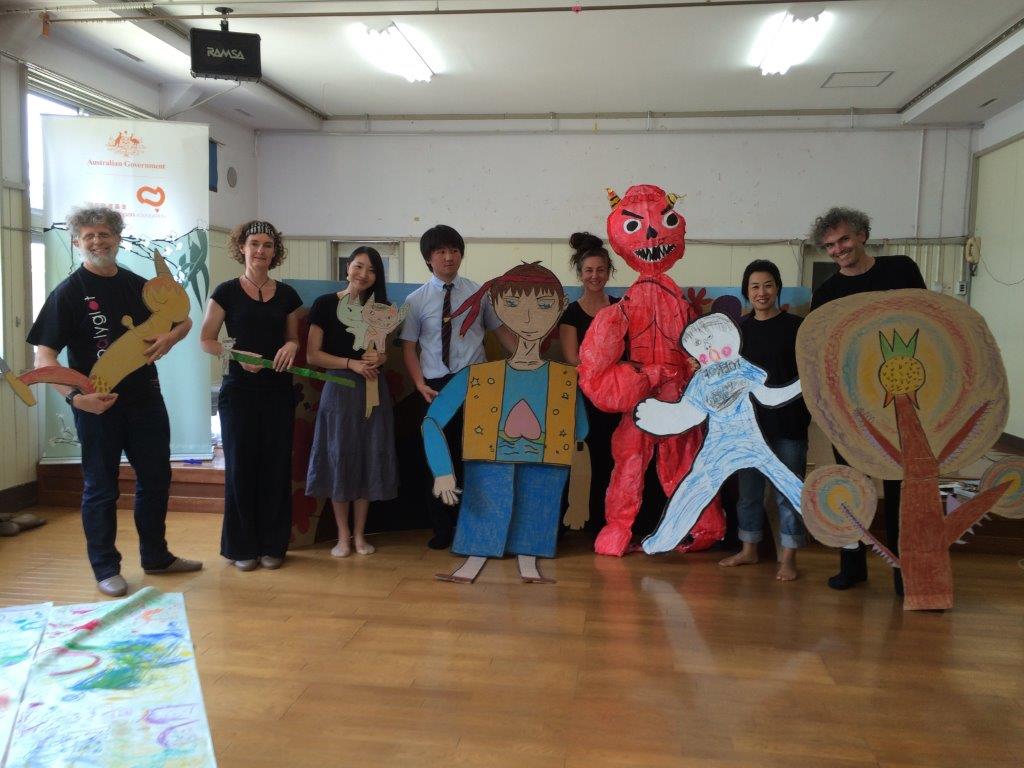
Workshop ‘Momotaro, tsugi wa?’(‘Momotaro, what happens next?’), held in Minamisanriku in 2015
This event was quite unique. First, Polyglot artists talked with elderly people who, at the time, were still living in temporary housing. They listened to their folk tales, and the theme of ‘Momotaro’ came up. Afterwards, in a workshop for children, we invited the children to think about the idea of ‘Momotaro’s next story’, to draw pictures, and together we created stories. One of these was a unique story in which the demon defeated by Momotaro makes friends, eventually gets married, has children, and, as a family, returns to the town where the children live. Finally, the members of Polyglot performed this story with puppets, and it was a great success.
Following the success of this 2015 collaboration, we visited Minamisanriku together in February 2018 and coproduced the ‘Paper Planet’ workshop. There too, professional artists arranged the children's works and put on a type of puppet show performance together. Collaborating with Polyglot is always fun and exciting.
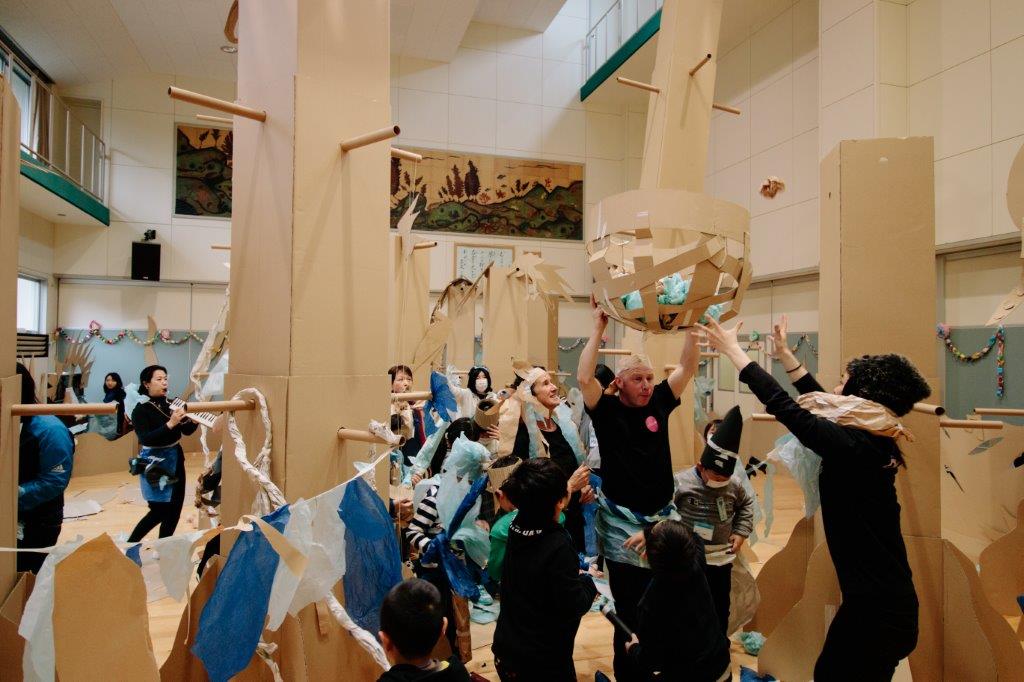
‘Paper Planet’ in Minamisanriku is always a huge success
—— Ms Atsuchi, how do you view the activities of Polyglot Theatre?
I think Polyglot Theatre is a team with a solid concept. With their concept of ‘the kids are the bosses’ they are always pursuing fun from a child's perspective. The main character is not the artist, but the children who participate. Artists create performances by thinking about how they should move so that the children can play independently.
At the root of this is a sense of having fun together. For Acchi Cocchi too, it is not about teaching music, but having fun together! I feel that we are a good match.
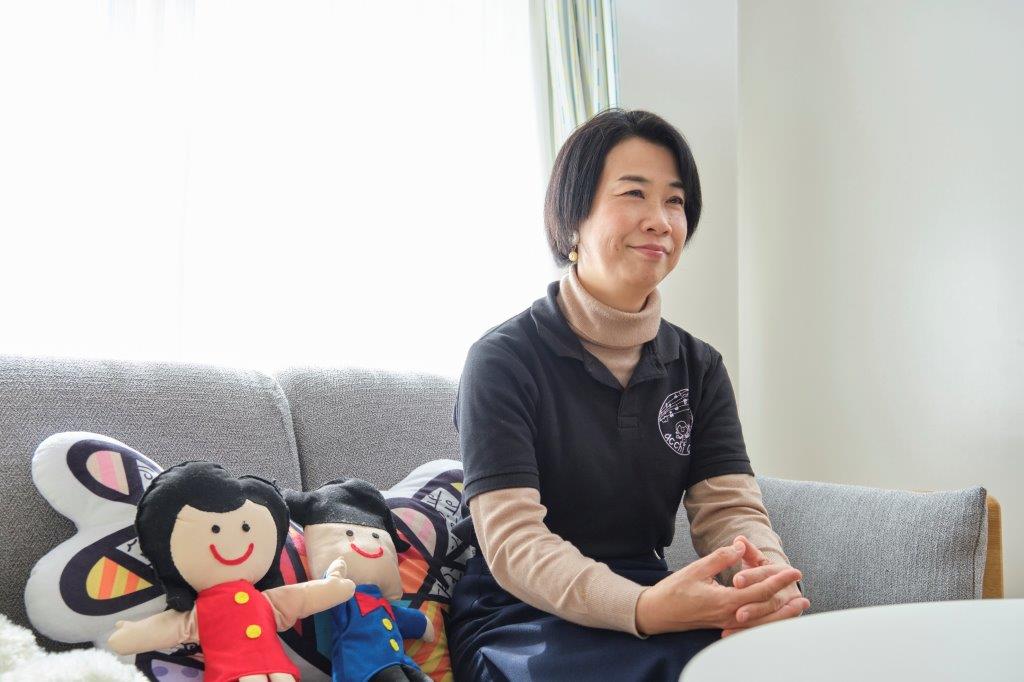
I was reminded that we both have a connection to Asia.
—— Is there anything that feels typically Australian about Polyglot Theatre's activities?
I don't know if this is a particularly Australian thing, but I was taken aback when Tamara Harrison from Polyglot Theatre, ‘We want to connect not only with Australia but also with Asia through our performances.’
I don't think Japanese have many opportunities to really feel that they are part of Asia, to feel an active link with Asia... Australians have a sense of being close to those in other Western countries as well. Tamara's words reaffirmed that we are Asians, and have the ability to connect with Asia. I think that this sense of embracing diversity in Australia is due to its unique culture. It is a very multicultural nation.

—— Ms Atsuchi, how do you view the current relationship between Japan and Australia?
I think it's an ‘easy relationship’. You might describe it as a relaxed relationship. There is no tense atmosphere politically or economically. If a major disaster like the Great East Japan Earthquake were to occur in Japan, Australians would immediately come to help. Similarly, Japanese people would also be concerned if there were catastrophic bushfires in Australia. I think it's a relationship where we can support each other, just like Polyglot and Acchi Cocchi.
An Australian style - professionals transforming children's works into art
—— Have you learned anything about art or culture from the members of Polyglot Theatre during your long relationship?
I feel that there is a difference between Japan and Australia in the attitude of, ‘Let's have fun with children’, and I am learning a lot from that. When Japanese see a child's work exhibited at school, they feel that it is ‘sacred’ and that they should never touch it, don’t they? Australian artists feel comfortable adding to and updating children's works.

Children's drawings become puppets!
For example, in the ‘Momotaro, tsugi wa?’(‘Momotaro, what happens next?’) workshop, Polyglot members turn pictures the children have drawn on paper into puppets and animate them. The children are so happy to go to school the next day and see their drawings turned into moving puppets. Having professional artists transform the seeds planted by children into art is an unforgettable experience for the children. I would like to emulate this process in some of Acchi Cocchi’s works.
—— Are there any events or initiatives in which you would like to collaborate with Polyglot Theatre in the future?
As Rainbow said, it would be great if the two groups could work together to create a performance piece from scratch. All the members have become quite close, so we definitely want to make this happen someday. I'd also like to see the members of Acchi Cocchi perform in Australia. This is one of the goals that I really want to achieve.
We want to plan an event to learn about Australia's nature and culture.
—— Do you have any dreams or goals that you would like to achieve through the activities of Acchi Cocchi?
Rainbow talked about a performance called ‘Forest,’ and Acchi Cocchi would also like to plan events where we can learn about Australia's nature and culture with the children. While they are playing, children can learn about Australia's rare animals and big, colourful insects...
For example, it would be interesting if we could collaborate with Polyglot for at the Australian Pavilion at the Expo 2025 in Osaka, Kansai. We would like to create a program where we can learn about Australian and Japanese culture from each other, and contribute in some small way to further building trust between Japan and Australia.
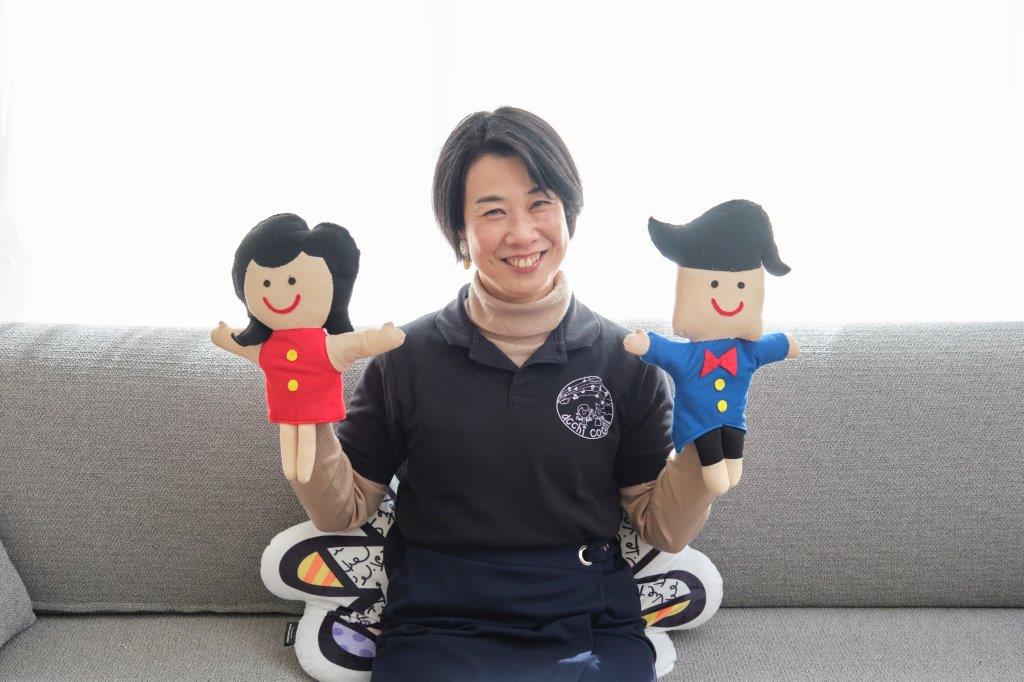
【interviewees】
Polyglot Theatre is a contemporary performing arts company based in Melbourne, Australia. Their participatory performances for children and families are known worldwide. Founded in 1978, the group has held numerous performances all over the world, including in North America, Europe, and Asia. It has been deeply involved in support for the reconstruction of the areas affected by the Great East Japan Earthquake, and has been conducting art activities to support the disaster areas in Minamisanriku, Miyagi Prefecture since 2013.
Rainbow Sweeny
Rainbow Sweeny has been active in the Australian performing arts and cultural sector for over 20 years. Her roles at Polyglot Theatre are wide-ranging, from the development of new works to the presentation of works and tour management. She finds great joy in bringing Polyglot Theatre's work to communities around the world. She is also an accomplished designer and has won the Green Room Award, a prestigious award in Melbourne's art scene. She is a graduate of the Victorian College of the Arts (The University of Melbourne).
Acchi Cocchi is an art group whose mission is to bring art and smiles to as many people as possible. It was established in Yokohama, Kanagawa Prefecture in August 2011 as a citizens' organization that contributes to society through the arts. The group started its activities supporting the areas affected by the Great East Japan Earthquake through young artists, and has now expanded its stage to include schools, nursing care facilities, and cultural facilities, holding events and workshops that fuse art and music.
Mikako Atsuchi
A graduate of the Piano Course, Music Department, Musashino Academia Musicae, Mikako Atsuchi worked for a classical music concert management company for 20 years. She is involved in a wide range of management work including artist manager, as well as concert and music festival planning, production, sales and public relations. In August 2011, she started an organization to support young artists, which became the predecessor of Acchi Cocchi. She founded certified NPO Acchi Cocchi in 2013, and became its president. Currently, they hold concerts and workshops at schools, nursing care facilities, local communities, cultural facilities, etc., as well as supporting disaster-stricken areas.
